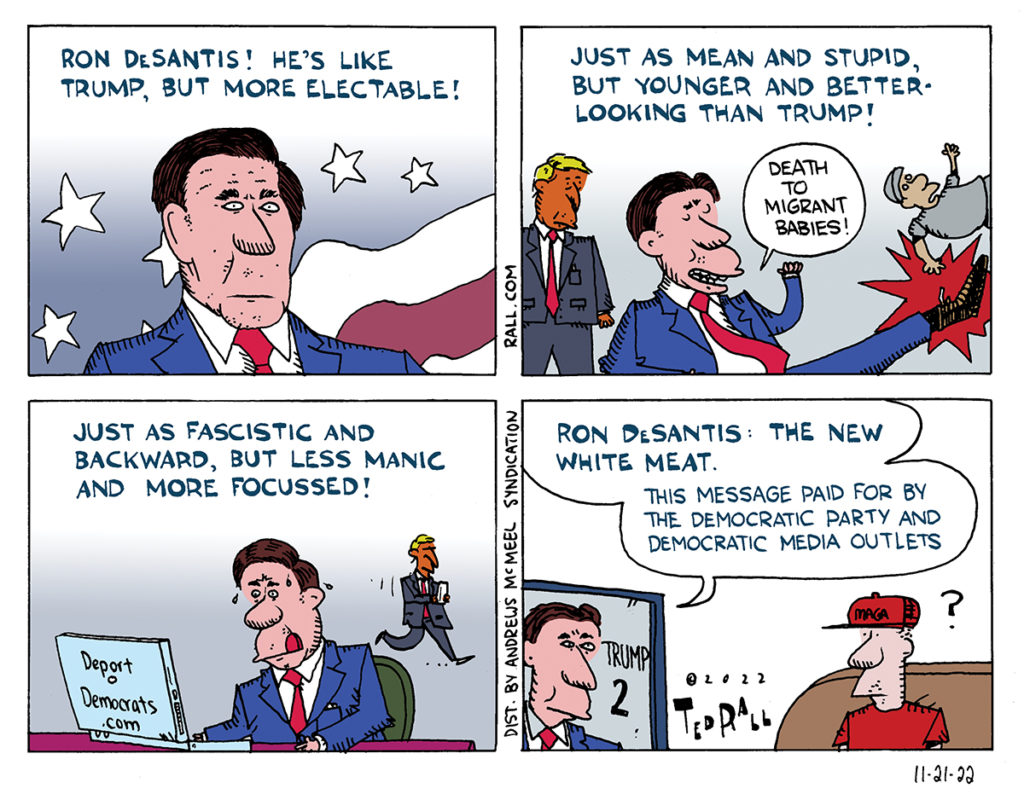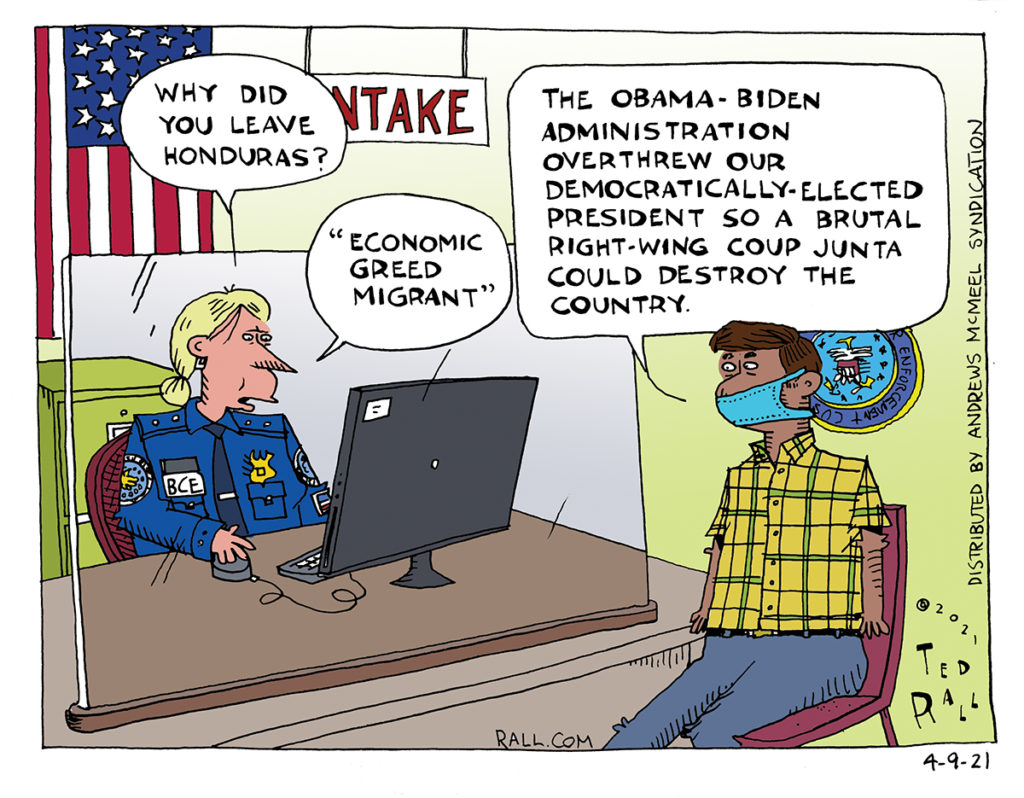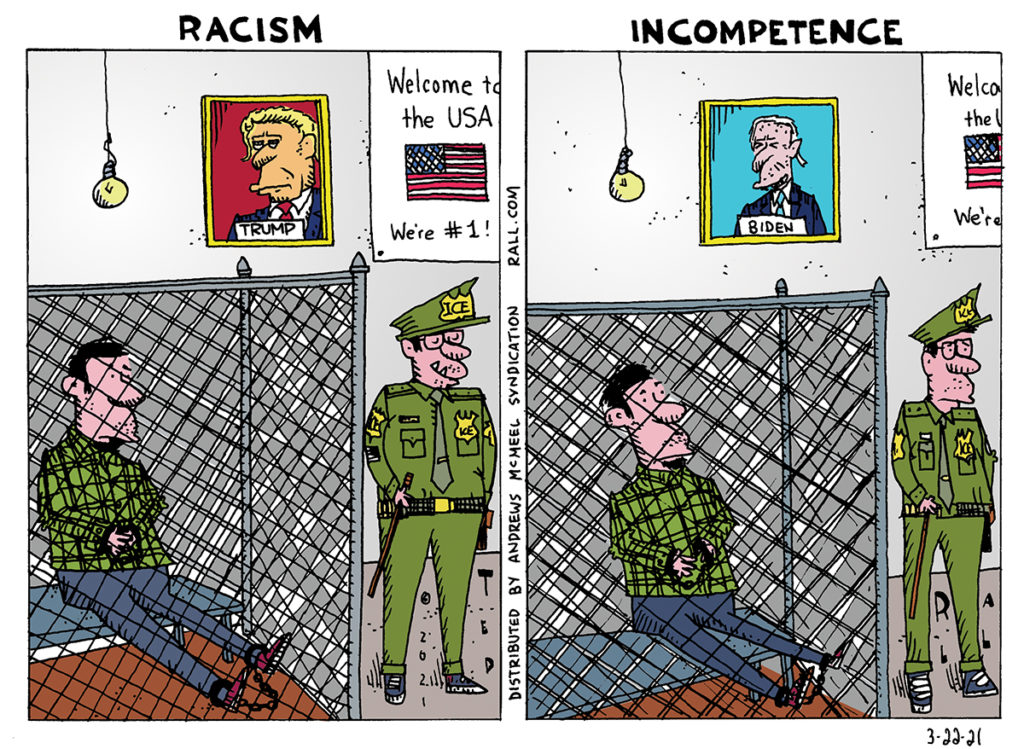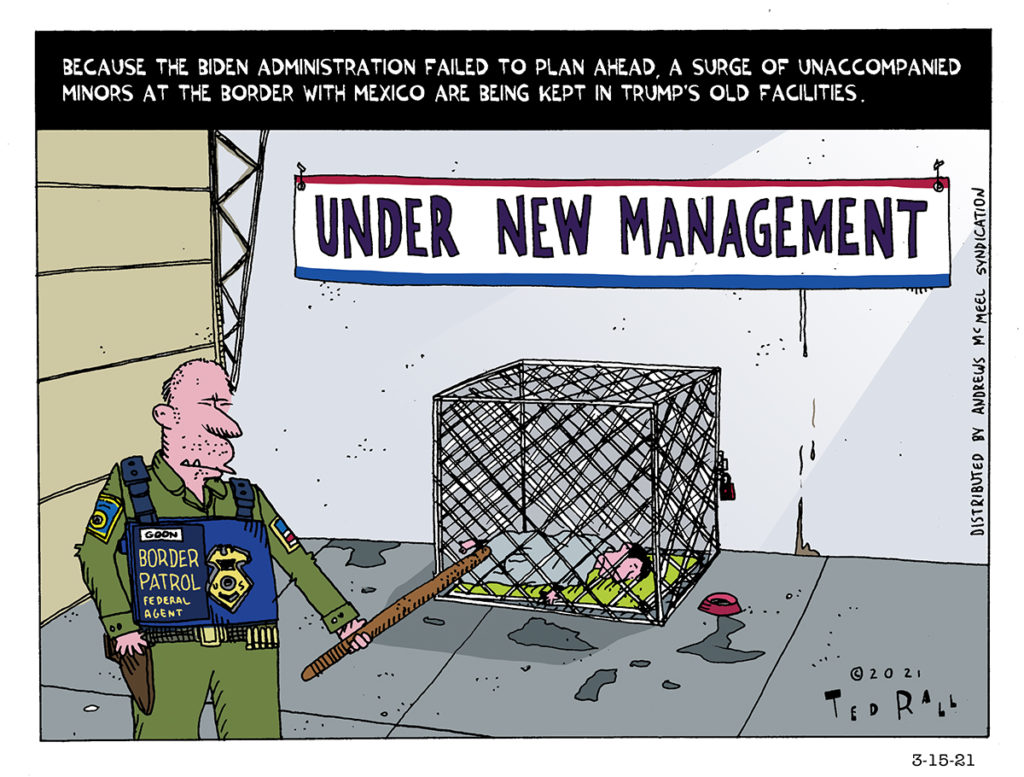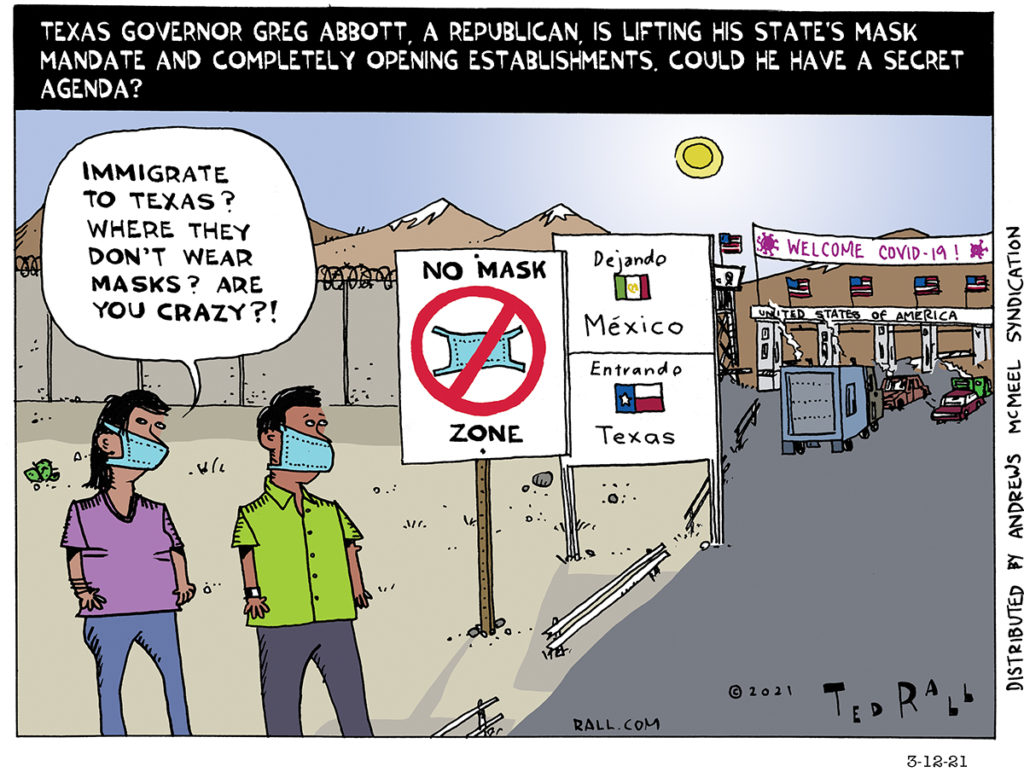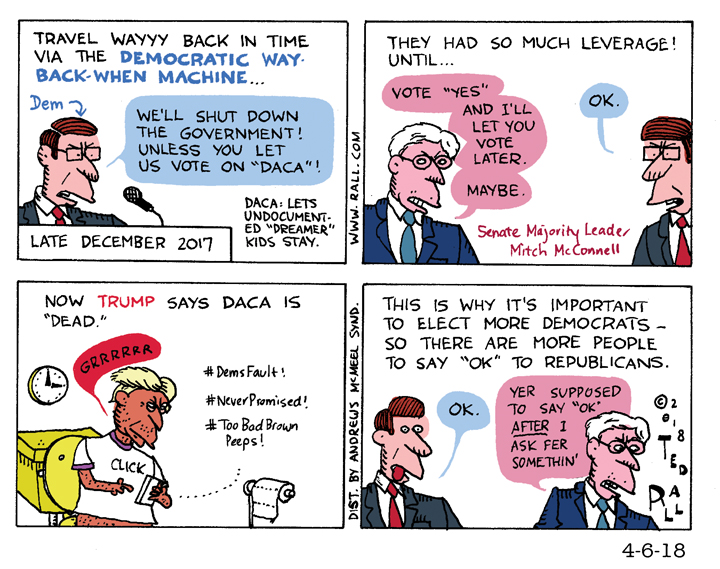Liberal media outlets and many liberal politicians are urging Republicans to nominate Florida governor Ron DeSantis instead of former president Donald Trump. They say he is just as right-wing as Trump but more electable. Then why would Democrats want to run against him?
Biden’s “Defense”: I’m Not Racist, I’m Inept
Experts on site at the southern border with Mexico repeatedly warned the incoming Joe Biden administration that they should expect a surge of migration coinciding with the new presidency. Apparently it happens every 4 to 8 years. But Biden ignored them. As a result, thousands of people are arriving without adequate facilities to house them, and they are being held in the scandalous dog cages used by the Trump administration.
Kids in Cages: under New Management
One of the major scandals of the Trump administration was that they imprisoned children and other people crossing the southern border into the United States in what were effectively dog cages. Experts on immigration warned Joe Biden that there would be an influx of migration following his inauguration, but he failed to plan ahead. Now Trump’s old dog cages are being used again.
SYNDICATED COLUMN: Meet the For-Profit Prison Industry Raking in Billions of Taxpayer Dollars from Trump’s Mass Deportation Boondoggle
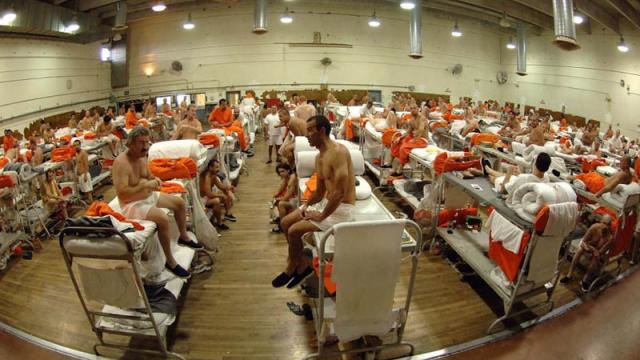
The Washington Post recently published a revealing and heartbreaking story about forced separation of children from their illegal immigrant parents — not the Trump-ordered fiasco we’ve watched over recent weeks at the U.S.-Mexico border, but in the Midwest as the result of brutal ICE raids that have ripped families apart under Presidents Obama and Bush before him. It’s beautifully written, worthy of a literature award if not a Pulitzer for journalism.
One line leapt out at me: “Who benefits from this?”
Nora, an 18-year-old girl who lost both her parents to ICE raids and is now raising her 12-year-old brother like something out of a dark 1970s ABC Afterschool Special or a Dave Eggers story, wondered why the U.S. government carries out such vicious policies and tactics, like using offers of free food to lure poor migrants into the clutches of heavily-armed immigration goons.
“Was it American taxpayers, who were paying to finance the raid and resulting deportations? Or American workers, most of whom were so disinterested in low-paying farm work that Ohio had announced a crisis work shortage of 15,000 agricultural jobs? Or Corso’s Nursery, a family-owned business now missing 40 percent of its employees?”
OK, so the canard about Americans being unwilling to fill low-paid agricultural jobs is transparent BS. The key phrase is low-paid. If all the illegal immigrants disappeared tomorrow the labor-market version of the law of supply and demand would force agribusiness employers to offer higher wages. Plenty of Americans would be happy to pick fruit for $25 an hour. Sorry, Corso’s — if you can’t afford to pay a living wage, you deserve to go out of business.
Still, Nora’s question is a good one. Whether you believe in open borders, want Trump to build The Wall or fall somewhere in between like me (build the wall, legalize the people already here who haven’t committed serious felonies, deport the criminals), everyone who cares about immigration should know the why and wherefore of how the U.S. government carries out deportations.
Contrary to what some liberals seem to believe, there is nothing unreasonable about border control. Determining who gets to enter your country’s territory, and who gets turned away, is one of the principal defining characteristics of a modern nation-state. Just you try to sneak into Latvia or Liberia without permission and see what happens. You can probably make it into Libya, but that’s because it’s a failed state.
After you catch illegal immigrants the question is, how do you deal with them?
Some countries, like Iran, deport unauthorized persons immediately, no due process. That’s what Trump wants to do.
Others treat them like criminals. Illegal immigrants caught in Italy face a hefty cash fine and up to six months in prison.
The United States falls in between. Applicants for political asylum are theoretically entitled to a hearing before an immigration court. Economic migrants receive no due process. Both classes face lengthy detentions before removal.
Lengthy detention is the key to Nora’s question.
So who benefits?
The answer is: America’s vast, secretive, politically connected, poorly regulated $5 billion private-prison industry. “As of August 2016, nearly three-quarters of the average daily immigration detainee population was held in facilities operated by private prison companies—a sharp contrast from a decade ago, when the majority were held in ICE-contracted bedspace in local jails and state prisons,” writes Livia Luan of the Migration Policy Institute.
Crime rates have been falling for years. So prison populations have been declining too. Adding to the down trend has been a rare area of bipartisan agreement in Congress; Democrats and Republicans agree that we need criminal justice reform centered around shorter sentences.
Originally sold as an innovative market-based solution to alleviate overcrowding in government-run prisons and jails for criminals, the private prison sector had been facing hard times before Trump came along. Private institutions were sitting empty. Until two years ago, private prisons had been scheduled to be phased out entirely by the federal sentencing system.
Trump made private prisons great again.
According to the UK Independent ICE arrests during Trump’s first nine months in office increased 43% over a year earlier. “Many of those immigrants are funnelled into a multibillion dollar private prison system, where between 31,000 and 41,000 detainees are held each night. In many cases, those private prison corporations — led by the behemoths GeoGroup and CoreCivic, formerly Corrections Corporation of America — have contracts with the federal government guaranteeing their beds will be filled, or that they will receive payment regardless of whether they have a full house on any given night.”
With profits guaranteed by pro-business government contracts, Wall Street is bullish on prisons for profit. “The Trump administration’s tough-on-immigration policies are unlikely to fade anytime soon, meaning investors should expect continued strict enforcement, more arrests by ICE and the need to accommodate a growing number of arrested individuals,” an analyst advised investors.
That’s likely to continue. In a classic example of the revolving door between government and private industry, the CEO of GEO is Daniel Ragsdale, who left his post as #2 at ICE in May 2017. Talk about swampy: ICE is extremely cozy with for-profit prisons.
When your customer base is as disenfranchised, unpopular and defenseless as convicts and undocumented workers, it’s tempting to cut corners on costs for their care. Reports of abuse and neglect are even more widespread in the private prison sector than in traditional government-run lockups. “The conditions inside were very bad. The facilities were old. The guards were poorly trained. If you got sick all they would just give you Tylenol and tell you to get back to your cell,” said Adrian Hernandez Garay, who served 35 months for illegal immigration at the Big Spring Correctional Institution, a Texas facility run by the private corporation GEO. He told Vice he was fed rice and beans seven days a week. He described Big Spring as “far worse” than other prisons where he was held.
Even if you think illegal immigrants are criminals who should be tossed out on their ears, you ought to be highly suspicious of the private prison industry. After all, they don’t want illegals deported. They want them housed indefinitely in their sketchy facilities. And you’re paying the bill.
(Ted Rall (Twitter: @tedrall), the political cartoonist, columnist and graphic novelist, is the author of “Francis: The People’s Pope.” You can support Ted’s independent political cartoons and columns and see his work first by sponsoring his work on Patreon.)
Actually, Forced Child Separations Are All-American
“This is not who we are.” Americans are saying this about the forced separation of children from their migrant parents at the border with Mexico. They said it about torture. Yet we keep doing these horrible things over and over again. So it isn’t really true. These horrible acts are exactly who we are.
SYNDICATED COLUMN: Remember When? The Border Wall Used to be a Left-Wing Thing
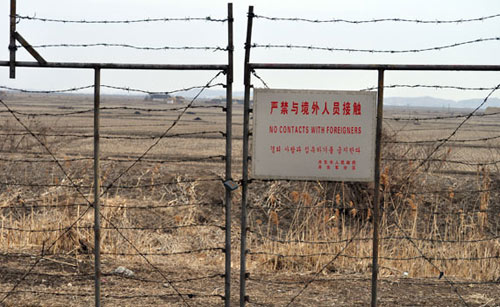
Illegal immigrants, President Trump claims, are pouring over the border from Mexico into the United States. That’s not true now; notwithstanding the ballyhooed caravan of Central American migrants who recently arrived at a California crossing, illegal crossings are hitting historic lows. There’s actually a net outflow. But it was true until the early 2000s — which is when the left was calling for a border wall.
“Legal immigration should become safe, legal and commonplace,” I wrote in 2005 in response to George W. Bush’s call for a guest worker program for illegals. I opposed Bush’s plan because it would hurt American wages and job prospects. “At the same time, no nation worthy of the name can tolerate porous borders. We can and must seal our borders to prevent economic migrants, terrorists and others with unknown motives from entering the United States.”
It seems strange to recall, but support for stronger border controls was a common thread among both the populists of the America-First Pat Buchanan right and the labor-protectionist left that backed Bernie Sanders. Now the right, led by Mr. Trump, monopolizes the cause of economic nationalism — but recent history shows that there’s a even stronger, non-xenophobic for protectionism on the left. The problem is, Trump and Congressional Republicans haven’t been willing to make concessions to get The Wall (or a cheaper high-tech alternative to bricks, mortar and corrugated fencing with negative environmental impacts).
For their part, Dems have adopted a policy stance that thoughtful leftists recognize as nonsensical and ideologically incoherent.
First, mainline Democrats have been arguing, we should look the other way as foreigners enter the country unchecked because we need undocumented workers to take low-wage occupations — picking fruit, plucking chickens, making our hotel beds — that Americans don’t want. But that’s not only is not true, it cannot be true. Without undocumented workers, employers would be forced to offer higher wages for those tasks they couldn’t automate. Inflationary risks and agriculture sector disruption notwithstanding, raising wages for unskilled labor would create upward pressure on wages up the salary chain. Simple supply and demand. The removal of 11 million consumers, however, would depress spending on goods and services as well as sales tax collections.
The other pillar of Democratic immigration policy is so absurd that the party rightly refuses to articulate it: that border controls are inherently racist and xenophobic. No other country thinks so. You can’t sneak into Uruguay or Tanzania or the Seychelles without a visa (much less look for work) and hope for anything other than arrest and deportation. Controlling the flow of human beings into one’s country isn’t bigotry. It’s one of the fundamental characteristics of a modern nation state. One could sooner do without minting one’s own currency or issuing postage stamps.
Yet the status quo, a tacit open door at various crossing points, is all Democrats have to offer: more of the same lunacy.
The only reason the Democrats get away with their sophistry is that Trump’s comments about illegal immigrants during the campaign (Mexican rapists, etc.) were so vicious and toxic. On immigration, he out-crazied the Democrats. In power, the Trump Administration’s aggressive enforcement of immigration laws has come across as gratuitously cruel.
Trump’s ban against visits to the U.S. by citizens of six Muslim nations said to be associated with terrorism was launched so haphazardly that families with visas and/or official refugee status were turned away at JFK airport after boarding planes in their home countries with legitimate documents. Refugees from Syria, where a civil war rages in part because one side was funded and armed by the U.S., have almost all been refused entry although most Syrians fleeing the war zone are doing so precisely because they are enemies of ISIS and other radical Islamist groups out to attack American interests.
News reports have showcased sobbing families watching relatives who came here illegally from Latin America but have lived exemplary, law-abiding (except for their immigration status) lives as entrepreneurs and parents, being sent to countries like Honduras where they fear for their lives. Trump threw the “Dreamers” — kids without criminal records who came to the U.S. essentially as luggage, with their parents — under the bus. Americans support borders, but not these kinds of deportations — and thus not this Wall.
You may have been born here. But there’s a good chance that someone in your family tree arrived at Ellis Island or somewhere else without their paperwork in perfect order.
Like any other country, the United States ought to vet everyone who seeks to enter its territory. We need less illegal immigration and more legal immigration. As we reduce unauthorized land crossings and overstayed visas, we ought to increase opportunities for foreigners to apply for legal visas with a clear path to a green card and citizenship. Unlike undocumented workers preyed upon by rapacious employers because they live in the shadows, legal immigrants can insist upon fair legal wages. Admitting them puts less downward pressure on wages.
We need a realistic approach to the estimated 11 million illegal immigrants currently here. So what if we wind up “rewarding” people who technically broke the law? We left the border open, we hired them, we chose not to enforce our own laws. This is what happens when a rich country leaves open its border with a poor one. Those who committed serious felonies (far fewer than three percent) should be carefully evaluated to see if they are likely to reoffend after serving their prison sentences; those determined not to have been rehabilitated should be deported to their countries of origin.
The others should receive amnesty. Most of the beneficiaries of Ronald Reagan’s 1986 mass amnesty worked out fine.
Immigration hardliners worry that each amnesty is a precedent for the next one, but that will only be true this time if we again fail to secure the border.
If Republicans keep the House next year, Trump will get his wall — or groundbreaking on one before a future Democratic regime halts construction. With that outcome less than certain (to say the least), Trump could secure the assent of the progressive populist base of the Democratic Party if he were to throw in legalization of the straight-and-narrow illegal immigrants who are already here along with an end to his Muslim ban.
Republicans could point to a promise kept on border protection. Democrats could throw a bone to a restive base on economic nationalism without climbing in bed with Trumpian xenophobia.
A win-win. Almost like Washington in the old days.
Never happen.
(Ted Rall (Twitter: @tedrall), the editorial cartoonist and columnist, is the author of “Francis: The People’s Pope.” You can support Ted’s hard-hitting political cartoons and columns and see his work first by sponsoring his work on Patreon.)
Vote Democratic! Who Else Would Always Consistently Vote Republican?
Are Democrats stupid? Are Democrats corrupt? Are they both? It’s hard to tell sometimes. Most recently, Democrats gave away the leverage that they had against President Trump and the Republicans when they agreed to sign off on a two-year spending deal that favored the Republicans in exchange for a tepid promise by Senate majority leader Mitch McConnell to allow a clean up and down vote on whether or not undocumented people brought to the United States by their parents as children would be allowed to stay permanently. Now the president is saying that there will be no such deal. Democrats aren’t even bothering to complain anymore. So why should anyone vote Democratic?

